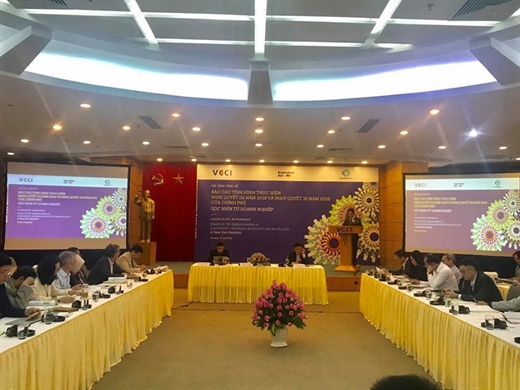Australia supports Economic Reform in Vietnam (Aus4Reform)
- en
- News and Media
- Aus4Reform News
- Only exceptional institutional reform can help Vietnam escape middle income trap
18/12/2019
Only exceptional institutional reform can help Vietnam escape middle income trap
Delay in administrative reform is proving to be a bottleneck for economic development, said Chairman of the Vietnam Chamber of Commerce and Industry Vu Tien Loc.
Only exceptional institutional reform can help Vietnam escape middle income trap
Delay in administrative reform is proving to be a bottleneck for economic development, said Chairman of the Vietnam Chamber of Commerce and Industry Vu Tien Loc.
An exceptional institutional reform is the only way forward for Vietnam to escape the possible middle-income trap, according to Vu Tien Loc, chairman of the Vietnam Chamber of Commerce and Industry (VCCI).
 |
| Overview of the workshop |
“Vietnam’s reform efforts must be put into a global context where countries are vying for higher competitiveness and the quality of business environment,” said Loc at a workshop under the program “Australia supports Vietnam’s economic reform” (Aus4Reform) on December 17, discussing the government’s efforts to improve the business environment.
 |
| Vietnam ranked 70th out of 190 economies in World Bank's Doing Business 2020 report. |
In the 2014 – 2018 period, Vietnam climbed 30 steps in terms of competitiveness in the World Bank's Doing Business Report, but remained far away from the top, staying at the 70th out of 190 economies in the 2020 report and was unable to break into the top 4 countries in ASEAN, Loc added.
According to Loc, the government’s Resolutions No.02 in 2019 and No.35 in 2016 mapped out specific targets, of which the main goals are to have one million enterprises and become one of the top four business-friendly countries in Southeast Asia (now including Singapore, Malaysia, the Philippines and Thailand) in 2020.
“Vietnam must beat Thailand at the 21st, which is 42 places ahead of us in the competitiveness ranking, to get into ASEAN-4,” said Loc, adding this is a challenging tasks.
Meanwhile, Resolution No.35 considers the private sector as a major driving force of the economy, targeting a contribution of 48% of the GDP by 2020.
“It is feasible for us to reach this target, but to have one million enterprises and enter ASEAN-4 by 2020 is a different story,” Loc stated.
Dau Anh Tuan, director of the VCCI’s Legal Department, said Vietnam posted growth of 17.3% in terms of business formations in the 2015 – 2018. If the country continues to maintain such growth in the next period, it would have 984,000 enterprises in 2020 and fall short of the target.
“Out of 40 provinces/cities that have signed commitments with the VCCI regarding the target of business creation, there is a possibility that only 27 would fulfill and exceed that commitment,” Tuan stated.
In 2017, Vietnam’s strong reform efforts were reflected in the Doing Business report, when the country climbed from the 82th to 68th place, but then slipped one notch in each subsequent year to the 70th in 2019.
“More worryingly, the reform progress in Vietnam is showing sign of slowdown,” Tuan said, referring to the World Bank-acknowledged five reforms in Vietnam in the Doing Business 2018, but only three in the 2019 version and two, namely “getting credit” and “paying taxes”, in the 2020 one.
Source: hanoitimes.vn

